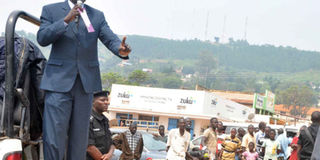The making of Mabirizi

The Independents Coalition candidate Joseph Mabirizi at a recent rally. FILE PHOTO
Joseph Mabirizi. The mention of his name at Uganda’s first-ever presidential TV debate last Friday would send the audience into ripples and social media platforms buzzing.
By the time curtains were drawn on the face-off, Mabirizi’s star, or infamy, had soared that a hash tag to immortalise his underwhelming performance was doing rounds on Twitter.
A clearly unknown entity before showing interest in the presidency, Mabirizi was always going to add a touch of comedy to the campaigns. Days before nomination, a mysterious grouping of 17 individuals met and united around him as their joint candidate. They came up with a shadowy body they called The Independents Coalition (TIC).
Omar Kalinge Nyago, the spokesperson of TIC, who was part of consultations that zeroed down on Mabirizi as the man to lead them to the country’s most coveted job, says the decision was down to the liking for results that they saw in him during meetings.
“He [Mabirizi] is not a man of stories. He is results-oriented. He is hard working. He is not a story-teller,” Mr Nyago speaks glowingly of the attributes that attracted the group of 17 political beginners to back Mabirizi. But save for the equally bizarre campaign that Mabirizi is conducting with Maureen Kyalya, the story of TIC ends where it starts.
And so barely a week after nomination, a difficult-to-believe story hit the news; a hotel in Iganga District had been raided by suspected plain-clothed operatives in the dead of the night and they had abducted Mabirizi. He was sleeping there during the campaign trail. He went missing for a day.
When he was later discovered along bushes on the Jinja-Iganga highway, he claimed his abductors wanted him to withdraw from the race. But security dismissed his version as a story meant to shore up his non-starter of a campaign. Usually unsuspecting Ugandans could not buy his version of events.
Ronald Ngobi, a pastor like Mabirizi, who has known him for more than eight years, says the man he knows does not have the cunning of character to fake a kidnapping and shockingly thinks someone wants the 40-year-old out of the race.
“He is such a humble guy. He is not a politician. He was just forced into politics by what is happening in the country. Police should be explaining what happened with the kidnapping,” says Ngobi, who is now part of Mabirizi’s campaign team.
Then as his campaign hit hard times, he decided to pull off a Kizza Besigye feat. He would go to a campaign gathering and rally supporters to fund his candidature with cash
. He was mistaken. A rally in the Kampala suburb of Kalerwe, where he chose to launch his fundraising campaign, flopped as he was booed off the stage.
But not before the presidential debate that a light was shone on the real Mabirizi.
Clad in a grey suit, punctuated with a checked tie, Mabirizi made a grand entrance and was accorded similar treatment to the other six contenders that showed up for the debate.
Journalists quickly mobbed him to get his thoughts on how he was faring in the campaigns and what he expected at the debate.
He quickly harked to his kidnap story and dropped a linguistic blunder.
“I was adapted by the police and it later claimed I had adapted myself,” Mabirizi told a crowd of journalists just after arriving at the Kampala Serena Conference Hall, repeatedly saying adapted instead of abducted, much to the amusement of the listening pack.
Throughout the debate, Mabirizi struggled with ideas, was incoherent, lacked sophistication and continued his linguistic gaffe.
Asked what he would do about the matter of uplifting the girl-child, Mabirizi gave a response that has since been the target of Internet memes.
“They should be given a position on every committee from up there to down there,” Mabirizi said.
Given a chance to redeem his rating by questioning the competitors, he chose to spoil it. “We have heard some voices that you support gays. What do you have to say about that?” Mabirizi asked former prime minister Amama Mbabazi.
Mr Mbabazi, in his proud self, shot back: “Which gays?”
Mabirizi caught flat-footed, retorted “Homosexuality” in slow motion, triggering a rippling of laughter in the audience.
Such was the sneering at his campaign that his own self-assessment is scathing. “Poor. I had a bad day,” is his instant assessment of his performance at the TV debate when I ask him to rate how he fared.
He concedes he had not researched, was caught unawares by the questions, but promises to put on a better show next time.
“I had a bad day, but anyone can have a bad day. I anticipated that things would be in some way but they were a bit different,” Mabirizi says before trying to cover up his uninspiring performance by arguing that even MPs at Parliament often get things wrong.
Mr Nyago, an integral member of Mabirizi’s campaign team, says his candidate is a “shy and quiet person” who is difficult to provoke and remains unfazed despite the storm that erupted following the debate.
“He is composed, he is not emotional, and it will be difficult to anger him,” Nyago says of what Mabirizi would have thought of the scorn that was thrown at him after the debate.
“He would have been just laughing at it.”




